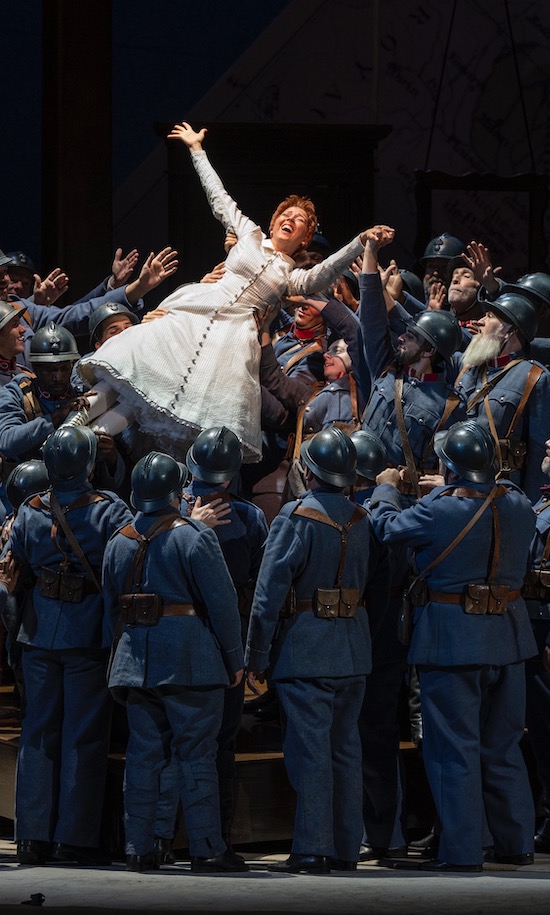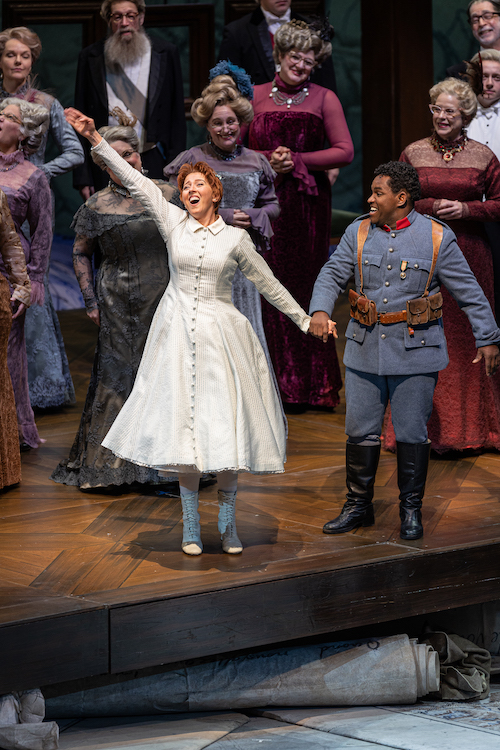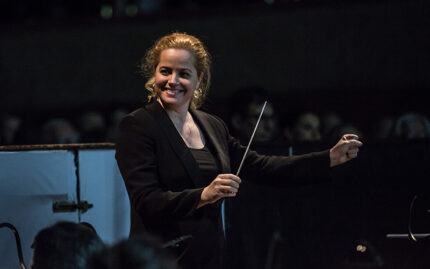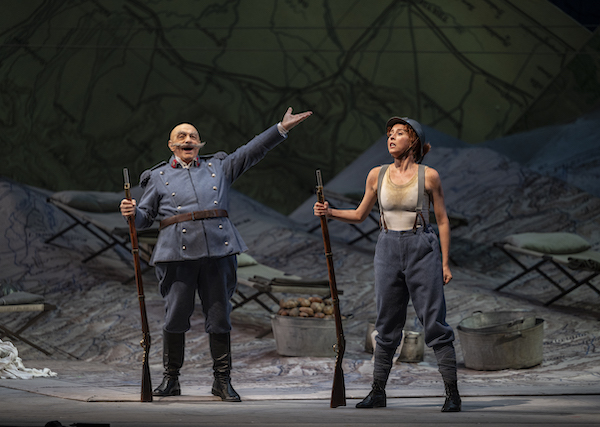Delightful Donizetti: Led by Oropesa’s charismatic debut, Lyric Opera delivers a winner with “La Fille”

So that’s what a great night at the opera is supposed to sound like.
It’s been some time at 20 N. Wacker Drive since a performance was interrupted repeatedly by spontaneous applause, enthusiastic cheers and resounding ovations at the curtain calls.
But such was the occasion when La fille du régiment opened Saturday to a deservedly vociferous reception, giving Chicago audiences one of their finest nights at Lyric Opera in recent years.
The performance marked the company’s first staging of Gaetano Donizetti’s 1840 opéra comique in a half-century. (For the archive-minded, Joan Sutherland and Alfredo Kraus starred in that 1973 Daughter of the Regiment with Richard Bonynge conducting.)
Written for the Paris Opera-Comique, La fille may be fluff, but it’s supremely crafted and richly tuneful fluff. The scenario tells the tale of Marie, an orphan who has been brought up by the kindly soldiers of the French 21st Regiment and now serves as their vivandiere or canteen girl. Marie is in love with Tonio, a Tyrolean who is viewed suspiciously by Sergeant Sulpice and her French regimental “fathers” but the lad is soon accepted by them at Marie’s urging. The wealthy, haughty Marquise of Berkenfeld, Marie’s aunt, whisks the girl away from the regiment for a more proper education and upbringing. Ultimately, Tonio and the regiment come to rescue Marie, family secrets are revealed, love triumphs, and all sing a stirring paean to France at the curtain.
Donizetti’s score is awash in melody with copious Gallic martial music. Yet the “Rataplan” hurly-burly is nicely balanced by solos for the two principals, which provide expressive depth as well as vocal fireworks—most notably in Tonio’s celebrated Act I aria with its nine high C’s.
The well-traveled Laurent Pelly production is functional enough— updated to World War I, with clever sets by Chantal Thomas—though not without issues. The director’s attempt to avoid cliches in this work (helmed here by revival director Christian Räth), sometimes takes the charm out of the characters as well as diluting the opera’s pageantry (no resplendent red soldier’s uniforms or tricolor banner-waving here). Also Pelly’s penchant for over-caffeinated silliness is fitfully distracting, with the campy, cross-dressing maids cavorting at the top of Act II the low point of the evening. And what’s up with the rooster at the curtain?
If the comedy was hit and miss, a vocally well equipped pair of lovers and a most impressive debut by conductor Speranza Scappucci overrode the lapses to make this La fille a delightful experience.
In her belated company debut, Met star Lisette Oropesa more than lived up to advance expectations, showing a theatrical charisma and the kind of genuine star quality that has been absent for too long on the Lyric stage.
Pelly’s retooling makes Marie less of a wide-eyed ingenue and more of a spunky and contemporary figure. If Oropesa sometimes overdid the tomboy swagger in Act I, the American soprano was undeniably an endearing heroine and consistently engaging presence—be it vigorously ironing the soldiers’ laundry, hilarious in her bad singing in Marie’s music lesson, or reacting to the goings-on with an array of facial expressions. Vocally, Oropesa was exemplary with top notes clear and true, albeit with a slight bit of insecurity in the highest coloratura. She rendered Marie’s wistful moments with refined tone and inward expression, most notably in a soulful and affecting “Quand le destin.”

Following last season’s disappointing Le Come Ory, Lawrence Brownlee was back and in top form as Marie’s beloved Tyrolean. The high-voiced tenor threw off Tonio’s showpiece (“Ah! mes amis … Pour mon âme”) in a ringing, full-voiced rendition nailing the nine top C’s. The tumultuous ovation that followed threatened to literally stop the show and so the aria was encored, with Brownlee hitting the stratospheric notes with even more confidence and panache. The tenor was just as stylish in the lyrical moments, delivering “Pour me rapprocher de Marie,” Tonio’s plea for Marie’s hand, with supple tone and touching sincerity.
Alessandro Corbelli remains peerless in buffa comprimario roles and proved a great asset as Sulpice, the regimental sergeant and Marie’s principal “father.” The Italian’s baritone has lost much of its heft but the old pro made up for the march of time with the relaxed humor of his characterization and easy stage presence, gamely entering into the dance steps with his younger costars.
As the Marquise, Ronnita Miller was an apt foil for the young lovers in a role that is as much spoken as sung, making credible the character’s eventual change of heart.
The soldiers of Regiment 21 collectively form nearly as prominent a character as the other principals. Pelly’s staging didn’t bring out much individuality among them, but the male chorus members fulfilled their active stage and vocal assignments with worthy energy and versatility.
In the spoken role of the battle-axe Duchess of Crackentorp, Marie’s prospective mother-in-law, Joy Hermalyn was miles over the top even for this caricature of a role. Alan Higgs proved more subtly amusing as Hortensius, the Marquise’s sniffy butler, demonstrating that in small comic opera roles less is often more.

Oropesa may have been the most prominent house debut Saturday night but the evening’s overall success was due just as much to conductor Scappucci, who was also making her Lyric bow. From the first notes of the Overture (and an elegant horn solo by acting principal Fritz Foss), the Lyric Opera Orchestra sounded transformed, as if released from a holding cell. The Italian-born conductor drew bracing vitality in the martial rhythms, accompanied the arias sensitively with a flexible, singing line, and demonstrated that Donizetti’s score is richer and more varied and rewarding than one had ever imagined. This is a conductor we need to hear more of in Chicago.
La fille du régiment runs through November 25. lyricopera.org

Posted in Uncategorized



Posted Nov 05, 2023 at 3:50 pm by Philip Kraus
I’m glad that the production was a success on the musical front, but why set a frothy romp like this in the drab, depressing years of World War I. When are opera director’s going to actually listen to the music and decide if such a setting fits the score. The answer is…no.
Posted Nov 06, 2023 at 8:12 am by Kate
I’ll be so sad to see the end of Anthony’s tenure. He’s brought so much to Chicago and kept our opera innovative in tough times. This was a perfect part of his send off season.
Posted Nov 07, 2023 at 8:39 am by Sylvie Romanowski
I have not seen the opera yet, but I can answer the question, why the rooster? The opera is set in France and is French. The rooster is a symbol of France that goes back several centuries. In French, “le coq gaulois,” it symbolizes the French nation’s pride and identity.
Posted Nov 09, 2023 at 11:48 am by Tsippi
I was so sad there were empty seats that night. The day before, Lyric was selling seats at 50% off, which means it could have even been worse. Before last week, I never imagined that a performance featuring Brownlee and Oropesa wouldn’t sell out immediately. I hope Lyric turns its reputation around, and I hope people get back in the habit of going to the opera the way they have returned to Orchestra Hall.
PS: I loved the performance so much I came home and bought another ticket. No way should I have been able to do that, especially for a perfect seat on a Friday night. Very sad.
Go see this opera, everyone. It is wonderful!!!
Posted Nov 11, 2023 at 10:52 pm by Jacob Hildner
Note to Lyric: More like this please. Yes, some of the camp was a bit too campy, and Sulpice looked like he was wearing a swim cap (just let him have his hair), but overall, with singers like these, with an incredible performer like Lisette Oropesa (I’m shamelessly head over heels), this production is a triumph that makes the case that every opera company needs to make with every production, especially now: that is, there’s something really great going on here you can’t get any other way, a thrilling event worth your time and money, even or especially from the cheap seats.
From my vantage point Friday in the lower upper balcony the stage and pit were both uncannily right in my ear, well-balanced and gorgeous. The sets were suitably stage-filling and eye-catching. The notably youngish crowd was into it.
In recent years, I’ve wondered about the continued viability of this thing — filling barns like the Civic Opera House with ancient foreign acoustic musicals invented, mostly, for smaller venues and different times. This production reminded me of great shows past, of the days of sold-out seasons, and that there’s nothing wrong with the genre or our beautiful house that can’t be solved with excellent execution, which first and foremost means star singers.
Posted Nov 18, 2023 at 2:28 pm by Robert E Lerner
Philip Kraus (a splendid opera director himself) said just the right thing. A true musical romp. One of the best of all light operas. But why set it so drably?! There was so much room for colorful “patriotic” high jinks. Almost like setting Oklahoma! in a concentration camp.
Can’t we please have fun– a bright colorful setting when it’s so clearly called for? Was the director reading “Ten Days in the Life of Ivan Denisovitch and not noticing that the music was related to Offenbach?
At any rate Brownlee and the soprano were supercalifrastic and Donizetti darn near out-did himself.
Posted Nov 19, 2023 at 5:24 pm by Randy Wilson
On the basis of this review, I set plans aside and saw the Sunday matinee of this today. What a joy it was to see and hear. I wouldn’t have gone if not for this glowing account. I’ll remember this performance with pleasure for a very long time.
As a curiosity, today was also the first time I witnessed a genuine “encore,” the tenor responding to the audience’s rapture by simply singing his aria a second time during the show.